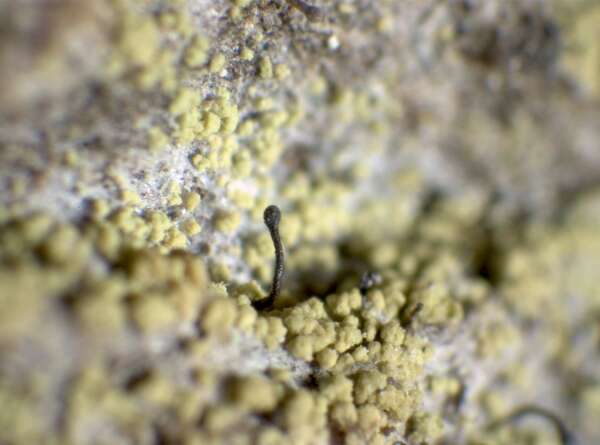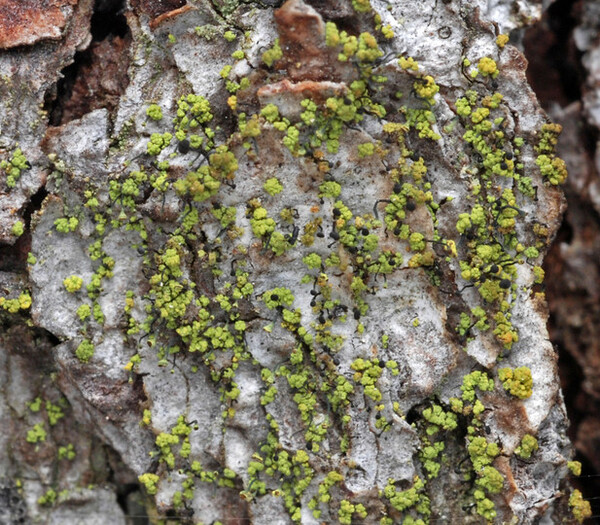Chaenothecopsis consociata (Nádv.) A.F.W. Schmidt
Mitt. Staats. allg. Bot. Hamburg, 13: 148, 1970. Basionym: Calicium consociatum Nádv. - Stud. Bot. Cech., 5: 10, 1942.
Synonyms:
Distribution: N - Frl (!), TAA (Puntillo & Puntillo 2009, Brackel 2016), Lomb (CLU 2040), Lig (TSB 33583, Brackel 2016).
Description: Thallus not evident, not lichenized. Apothecia long-stalked, pin-like 0.7-1.3 mm high. Stalk slender, 0.05-0.1 mm thick, black, the central part formed by colourless, intricately interwoven or partly periclinally arranged hyphae, the outer part formed by periclinally arranged, dark reddish brown hyphae. Capitulum obconical or subdivided into smaller capitula, 0.2-0.3(-0.4) mm across, often faintly white pruinose on upper surface, with an exciple of intertwined and sclerotized, reddish brown to dark brown, intertwined hyphae; mazaedium not present. Epithecium thin, reddish brown; hypothecium reddish brown. Asci 8-spored, cylindrical, with a thickened apex penetrated by a narrow canal, formed singly, persisting until the spores are mature, with 1-seriately arranged ascospores. Ascospores 1-septate, dark brown with a paler septum, ellipsoid, 6-8 x 2-2.5 µm, with a smooth wall. Photobiont absent. Spot tests: epithecium, exciple and hypothecium K+ persisting green. Chemistry: an unidentified, reddish, K+ green pigment.Note: parasitic or parasymbiontic on Chaenotheca chrysocephala on trunks of old trees in ancient and humid, montane to subalpine coniferous forests; certainly more widespread in the Alps, but not common.
Growth form: Lichenicolous fungus
Substrata: bark
Reproductive strategy: mainly sexual
In underhangs rarely wetted by rain
paras Chaenotheca chrysocephala
Commonnes-rarity: (info)
Alpine belt: absent
Subalpine belt: very rare
Oromediterranean belt: absent
Montane belt: very rare
Submediterranean belt: absent
Padanian area: absent
Humid submediterranean belt: absent
Humid mediterranean belt: absent
Dry mediterranean belt: absent

Predictive model
Herbarium samples
Growth form: Lichenicolous fungus
Substrata: bark
Reproductive strategy: mainly sexual
In underhangs rarely wetted by rain
paras Chaenotheca chrysocephala
Commonnes-rarity: (info)
Alpine belt: absent
Subalpine belt: very rare
Oromediterranean belt: absent
Montane belt: very rare
Submediterranean belt: absent
Padanian area: absent
Humid submediterranean belt: absent
Humid mediterranean belt: absent
Dry mediterranean belt: absent

Predictive model
| Herbarium samples |
 INDEX FUNGORUM
INDEX FUNGORUM
 GBIF
GBIF
 DOLICHENS
DOLICHENS




